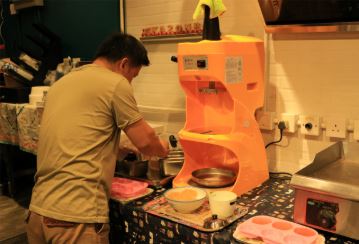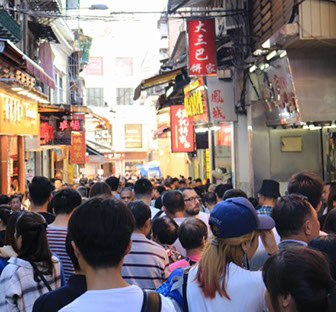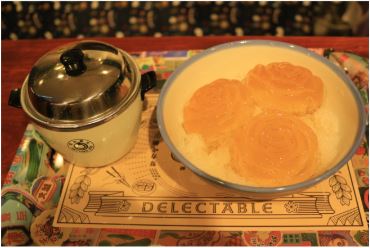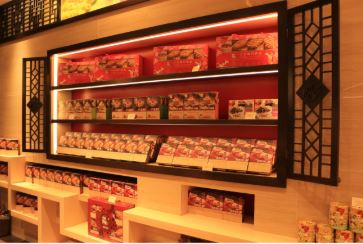
"City of Gastronomy"
Rosita Ng Ian I, Olivia Leong Ka Wai
In 2017, Macao was designated as a "Creative City of Gastronomy" by the United Nations Educational, Scientific and Cultural Organization (UNESCO). For this title, the Macao government is promoting the local unique food culture, expecting this can bring more development opportunities to Macao, to encourage tourism and establish the reputation as the "World Tourism and Leisure Center".
However, Macao is the third city that has this title in China, after Chengdu of Sichuan and Shunde of Guangdong. Compared with these two cities, Macao lacks traditional food, and is not as unique as the Sichuan cuisine. Therefore, the Macao government and the catering industry should consider how Macao food can be carried forward to promote the tourism development, in order to live up to its reputation as the gourmet capital.
Actually from the last year, the Macao government has been promoting the "City of Gastronomy" by hosting events for tourists and local people, including "The Year of Macao Food, 2018" and coming up with a plan to reinforce the title as the gourmet capital in four years. The government hoped that this UNESCO designation can add another attraction for tourists. However a year later, how will tourists and citizens think about the food industry in Macao? Does Macao deserve the title of the "City of Gastronomy"?
Mr. Chang, who is from Taiwan and now runs a Taiwanese style shaved ice shop in Macao. He used to have a stall in the Shilin Night Market in Taiwan. He got to know a young entrepreneur from Macao who loved Taiwan culture and introduced him to Macao to set up a Taiwanese restaurant. "Anyone who runs a restaurant in Macao is bound to know that Macao is named as the 'City of Gastronomy' by the UNESCO," Mr. Chang said. He has lived in Macao for five years, he found that although Macao has different types of restaurants and many Michelin restaurants in hotels, it still lacks unique local specialties and prices of food are expensive.
"However, in order to cater to the taste of Macao citizens, many restaurants will adjust their taste to satisfy the market's needs. Maybe in this way, it can become the characteristics of Macao cuisine and develops Macao's own cuisine culture gradually," Mr. Chang said. He stated that the government is doing enough to promote Macao to tourists. He had been to some tourism exhibitions in Taiwan and seen the promotional activities about the "City of Gastronomy" of Macao.


Does everyone in the catering industry really know that Macao's new title of "City of Gastronomy"? The truth does not seem to be impressive. Ms. Liao, a staffer of a traditional bakery in Macao, said that she has never heard of Macao being a "City of Gastronomy". "I don't think the food culture of Macao is more special than other places. Although Macao is the city with the new reputation, it is difficult to attract tourists to Macao just because of this title," Ms. Liao said. She believes that the most impressive food for tourists in Macao are Portuguese egg tarts, pork chop bun or bovine offal, etc. But they are already well known to tourists.
"Although less people know that Macao is known for this reputation, I found that the Macao government has held various activities this year to attract tourists and citizens in order to promote Macao's food, such as the activities in the old area in Macao and the night market," Ms. Liao said. Also, these activities will provide some shuttle buses for tourists. Ms. Liao said that these activities can increase the business of her bakery which is near the market. The promotional efforts were effective, she said.

In the other hand, Macao citizens and tourists also have different opinion about the quality of the gourmet industry. Mr. Li, a tourist from Guangzhou, said, "Although I have heard of the reputation of "City of Gastronomy" about Macao, I think that the Macao government lacks publicity and promotion to tourists." He expected to spend MOP500 to 1000 in his two-day tour in Macao. "But, the prices of food in Macao are higher than mainland China and I think it is a little bit expensive, especially the famous restaurants in hotels," Mr. Li said. He prefers to find food in the city because it is more affordable and get in touch with the food culture of Macao local people.
Also, he has searched the recommended restaurants in Macao on the Internet. He felt that Macao's local food is mostly in residential areas, such as roadside diners, hawker stalls, tea houses and coffee shops, etc. However, because he is not familiar with the streets of Macao, it took him a long time to search these locations by a mobile phone map. "I suggest that the Macao government can design an authentic Macao food map to provide a clear guideline for tourists to find these food places in popular tourist spots, such as the Border Gate, outer harbor ferry terminal and airport," Mr. Li said.

At the same time, Mr. Cheang, a citizen of Macao, knows that Macao has been designated as the "City of Gastronomy". He also believes that the food culture of Macao can meet this title. "Because there are many different types of restaurants in Macao, such as Southeast Asian, Portuguese and Japanese. People can eat different food from different countries in one place. In order to meet the market demand, there are many new restaurants in Macao in recent years, such as vegetarian coffee shops, animal coffee shops and fusion cuisine restaurants. I think these features are the advantage of Macao food culture," Mr. Cheang said.
But he thinks that Macao government lacks promotion of the new reputation and many of his friends in the mainland do not know this UNESCO designation. "The Macao government can engage in publicity in different tourist attractions and make advertisements on billboards. Also, it should promote it on social media, such as Facebook, WeChat or Weibo, etc. These social media can attract the young generation," Mr. Cheang recommend.
To conclude the opinions from the tourists and citizens, the majority think improvement is needed, especially in the food prices which are expensive. As for the authentic food of Macao, a majority are Portuguese food, so tourists think there is a lack of the traditional Chinese cuisine, but there are other kinds of cuisine in Macao, including Portuguese, Korean and Japanese, Vietnamese, Thai and Burmese, and these cuisines are also fused with Macao taste, which is considered as Macao features. Furthermore on transportation, tourists suggested that the food patrol bus service can be implemented which can help visitors to understand Macao specialty food stores.

BACK
Copyright © Umac Bridges Fall 2018